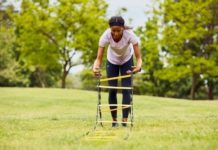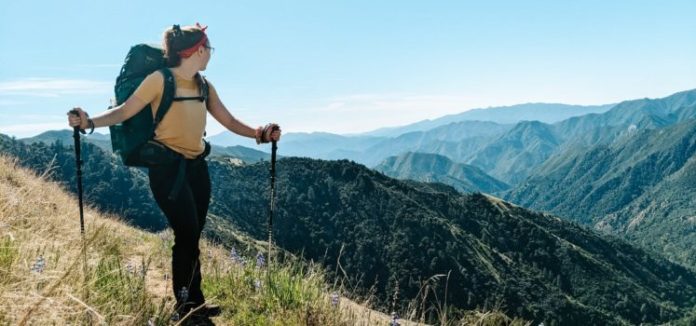Mikaela Ferguson is on a mission: to give you the knowledge and skills you need to take better trips outside.
No stranger to the outdoors, Mikaela fell in love with backcountry tripping when she was a kid at camp. She trained to be a trip guide so she could spend more time outdoors and started leading trips at camp and eventually for tour companies, including a stint leading outdoor tours in Nunavut, Canada. Mikaela is happy traversing the wilderness: “Anywhere I can have a tent and be away from civilization.”
It was after she stopped guiding professionally that she started taking solo trips in the backcountry. While she does sometimes bring friends and family with her, she often goes out solo. “If I waited for someone to go with me, I might never get to go,” she tells me over Zoom. “Once I get the idea to do a particular route, I don’t want to wait.”
Going solo has its challenges and benefits. When going alone, Mikaela often plans longer and more rigorous days. She likes to be active rather than having long afternoons alone with nothing to do. Some people do enjoy that alone time on a solo trip, but Mikaela would rather plan a more vigorous route and go at her own pace.
One of the biggest challenges to going solo is the preparation involved. Not only do you have to carry all of your gear (and have the skills to paddle your own canoe if it’s a canoe trip), but you need to take a more rigorous approach to risk management. “If I get myself into a situation, I need to know I can get myself out of that situation alone.” With a group, if someone gets injured, you can coordinate a rescue. Alone, you have to make sure you can take care of yourself.
But Mikaela doesn’t want to discourage anyone from going out alone, especially women who are often told that it’s not safe. “If anything, it’s a man problem,” Mikaela says. She shared that most times she’s felt uncomfortable in the backcountry have been when she’s come across a solo male hiker who asks too many questions.
If you’d like to start going into the backcountry solo, Mikaela has three tips for you:
1. Ease into it
Before you dive into backcountry camping, start by getting comfortable going solo car camping. You’ll get to practice setting up your tent and preparing your meals on your own. If you forget anything or aren’t enjoying the experience, you can just get in the car and go somewhere else.
You should also practice going on day hikes or solo paddles alone. Once you’re comfortable paddling or hiking and camping on your own, you’re ready to go into the backcountry!
2. Be extra prepared
Take a wilderness medicine or wilderness first aid course. Learn how to make a route card and a search and rescue call before you head out on your first solo trip. Have a plan for what to do in case of bad weather or injury, follow rules about food storage and study the map so you’re familiar with the route and campsites including any shortcuts to exit the park if needed.
3. Be self-aware
When going solo, it’s important to be honest about anything that might be a limiting factor for you. Don’t plan a route that requires you to hike or paddle the longest distance you’d be comfortable covering in a day. Give yourself buffer time to get lost or tired or run into unexpected obstacles en route—especially if it’s your very first solo trip.
Think about what challenges might come up for you mentally or physically along the way. Are you afraid of animals? Nervous about being lost? Afraid you might get injured? Spend extra time preparing for what scares you.
Fear is one of the most common reasons people don’t go into the backcountry. But with the right planning and preparation, Mikaela doesn’t think fear should hold you back. “I’m afraid of a lot of things in the backcountry,” she tells me with a laugh. Mikaela is especially afraid of the dark but mitigates that fear by packing a bright flashlight with extra batteries so she doesn’t have to worry about leaving the tent at night to use the bathroom. She also downloads music, podcasts, audiobooks or even an episode of a comedy on Netflix so she can throw on headphones and distract herself if she gets nervous in the middle of the night.
If you’re afraid of animals, research common animal encounters in the park and perhaps pick a park closer to a city with less wildlife. You can also prepare yourself with a bear canister and bear spray (and you should always follow local rules surrounding food storage). If you’re worried about navigating in the wilderness select a route with well-marked trails. If you’re worried about being injured, take a first aid course.
“It’s probably not as scary as you think it’s going to be, but if you don’t like [the trip] you can always bail.” Mikaela herself has done it—she once started a trip and wasn’t feeling it, so turned around and car camped instead. But it’s a rare occurrence for her. Despite her fears, Mikaela enjoys her trips and is always looking for new ways to get outside.
If you’re feeling ready to plan a backcountry trip, be sure to check out Mikaela’s website, Voyageur Tripper, for trip reports and information about staying safe and having fun in the backcountry.
Featured photo by Mikaela Ferguson










